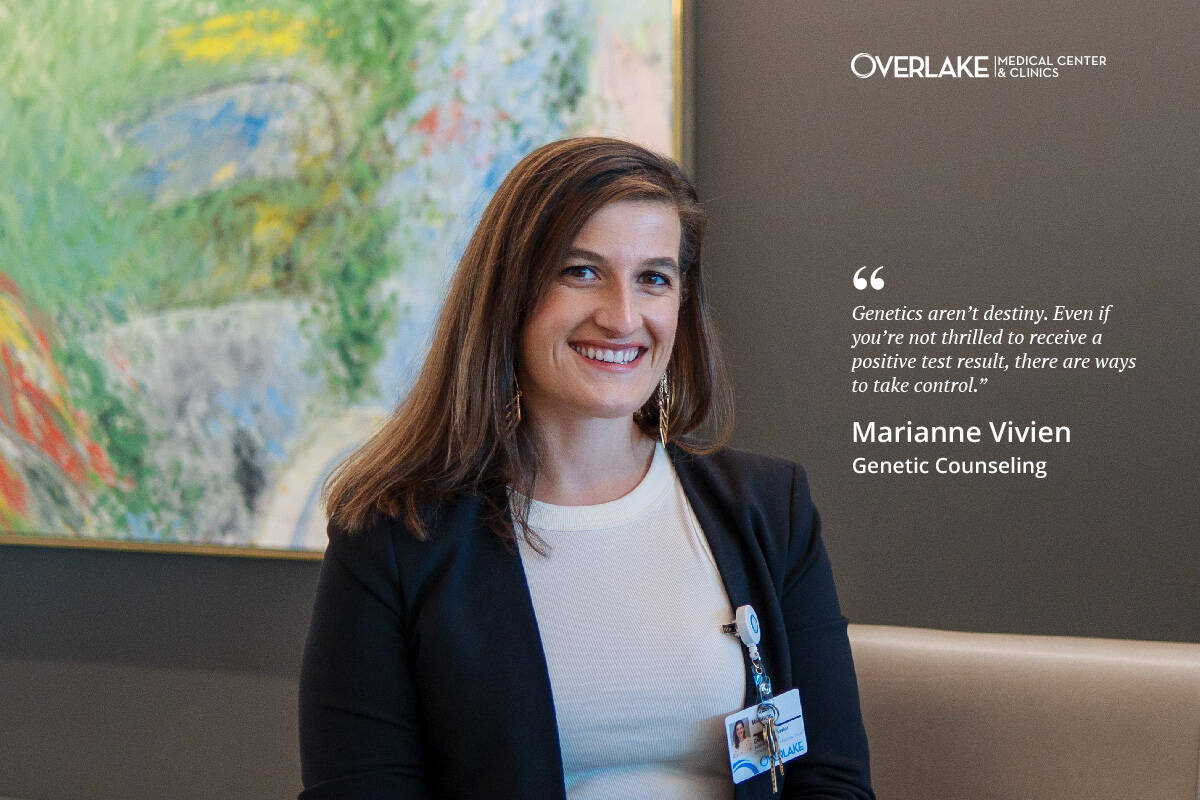If you had a genetic predisposition for cancer, would you want to know?
Some people hesitate — why worry about something you can’t control? But Marianne Vivien, MS, LCGC, a genetics counselor at Overlake Medical Center & Clinics, says there are many actions you can take once you know you’re at a higher risk.
“You can take a proactive approach to catch cancer early, when it’s more easily treated. High-risk patients may be able to start cancer screening early or get screened more frequently, and can share that valuable information with family members. They aren’t obligated to get tested, but may choose to talk to their primary care physician.”
Patients who have already been diagnosed with cancer may choose genetics testing to find out if they’re at risk for other cancers, or to gain a better understanding of their cancer’s cause.
Who should get genetics counseling?
“Anyone can speak with a genetics counselor to understand their risk. About five to ten percent of cancers are due to a genetic predisposition,” Marianne says.
Indications you may be at increased risk:
- Strong family history of cancer
- Family members diagnosed with cancer at younger ages (50s or younger)
- Multiple generations of family members affected with similar cancers
Genetics counseling doesn’t always include testing
Meeting with a genetics counselor like Marianne Vivien doesn’t necessarily mean you’ll have to send a sample of your DNA to a lab.
“We start by going through the patient’s personal and family medical history, looking for hereditary patterns. Regardless of test results, you may be eligible for early or more frequent cancer screening.
Can genetics testing lead to discrimination?
The 2008 federal law GINA (Genetic Information Nondiscrimination Act) prohibits employment and medical insurance discrimination based on genetic information. However, that protection does not extend to other types of insurance including life, disability or long term care. Certain careers, including the military, are also exempt.
“A patient’s results should not impact a family member’s ability to get insurance,” Marianne says. “Before doing any testing, I advise my patients to conduct the necessary research and understand potential implications.”
Multiple genetic tests are available
Many people first learned about genetics testing when Angelina Jolie chose to have preventative bilateral mastectomies after genetic testing revealed she had the BRCA1 gene mutation.
“That inspired a surge in genetic testing, but since then, many more tests have been developed as we’ve discovered other cancer genes. If you tested negative for BRCA a decade ago, you may still be at increased risk for other cancers, and may be a candidate for other tests.”
Genetic counseling goes beyond cancer, too. Marianne Vivien also helps patients with cardiogenetics and pre-conception/prenatal genetics.
You’re in control
“Genetics aren’t destiny. Even if you’re not thrilled to receive a positive test result, there are ways to take control. This field has changed so much in just the last five years — our technology is better, our knowledge is better, and your options are better.”
Talk to your doctor to find out if genetic counseling is right for you, or make an appointment with Marianne Vivien at Overlake Cancer Center, 1135 116th Ave. NE, Suite 200, Bellevue. Call 425-635-3400 or visit overlakehospital.org to learn more.


